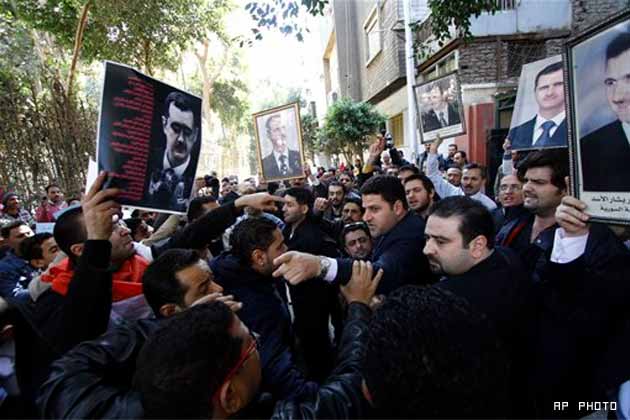Syria Feature: 20 Things You Need to Know (Whitaker)
 Photo: APBrian Whitaker writes for The Guardian of London:
Photo: APBrian Whitaker writes for The Guardian of London:
1. Greater Syria: Syria was the name once applied to most of the territory on the eastern side of the Mediterranean Sea and in the seventh century it became the seat of the Umayyad caliphate. The smaller modern state of Syria – adjoining Turkey, Iraq, Jordan, Israel and Lebanon – began as a French mandate when the Ottoman empire was broken up after the first world war. It became independent in 1946. Its capital, Damascus, is one of the world's oldest continuously inhabited cities.
2. Order of the Ba'ath: The Ba'ath party, which has dominated Syrian politics since seizing power in 1963, was founded in 1947 as a pan-Arab nationalist and socialist "renaissance" movement. Its slogan is "unity, freedom, socialism". Under President Hafez al-Assad (1971–2000), the Ba'athists consolidated central government and brought a measure of stability to the country – though at a high cost in terms of repression.
3. President Bashar: Bashar al-Assad was in London, pursuing a career in ophthalmology when his elder brother, Basil – heir apparent to the presidency – died in a car crash in 1994. Bashar was recalled to be groomed for power. When his father died in 2000, Bashar was made head of the army and leader of the Ba'ath party. But at 34, he was too young to become president under the Syrian constitution. The age qualification was hastily revised and he was "elected" president in a referendum. His wife, Asma Akhras, was born in Britain to Syrian parents. She formerly worked as an investment banker at JP Morgan.
4. The occupied Golan: The Golan Heights, a mountainous and strategically import area bordering the Sea of Galilee, was captured by Israel during the 1967 war. Part of it was handed back after the 1973 war, but the return of the remaining territory has been one of the Syrian regime's principal goals ever since. There is a spot on the ceasefire line known as Shouting Valley where Syrians use megaphones to hail their relatives on the other side.
5. The Hama massacre: In 1982 Syrian forces launched a brutal assaulton the city of Hama to quell an uprising by the Muslim Brotherhood, killing thousands. Memories of the event, which is rarely mentioned publicly in Syria, continue to cast a long shadow over political opposition to the regime.
6. Elegant lines: Syria has some of the world's most beautiful railway stations.
7. Syria and Lebanon: Lebanon was separated from Syria under the French mandate, since it was largely a Christian enclave, and became officially independent in 1943. From Damascus, Lebanon still tends to be viewed as part of Syria's traditional sphere of influence. Syria used its military to stabilise Lebanon after the 1975-91 civil war but also meddled extensively in Lebanese politics.
Protests and diplomatic pressure after the assassination of former prime minister Rafik Hariri in 2005 forced Syria (which was widely blamed for the attack) to withdraw its troops. However, Syrian influence continues, with Lebanese politics divided into the pro-Syrian "March 8" camp and the "March 14" camp backed by Saudi Arabia and the US.
8. Hooray for the president: During public speeches in Syria, it is customary to applaud each time the name of President Assad is mentioned.
9. Religion and the Alawites: The Alawites are a secretive religious sect usually regarded as an offshoot of Shia Islam. In Syria they are a tiny minority but, through the president's family and others in senior positions, they are dominant within the regime. About 74% of Syria's inhabitants are Sunni Muslims; Shia Muslims (including the Alawites and Ismailis) account for 13%, various Christian groups 10%, and Druze 3%. Jewish communities have existed in Syria for centuries but today their number is extremely small – probably no more than a few dozen people.
10. Crony capitalism: Despite its socialist origins, the Syrian regime is plagued by corruption and crony capitalism – especially involving relatives of the president. A particular target of protesters is Rami Makhlouf, Assad's cousin, who was sanctioned by the US Treasury in 2008 on the grounds that he "improperly benefits from and aids the public corruption of Syrian regime officials".
11. Kurdish aspirations: Syria has a marginalised Kurdish minority who are thought to number about 1.75 million – roughly 10% of the total population – and the regime has made persistent efforts over the years to Arabise them. Many of the Kurds, meanwhile, aspire to have their own independent state including other Kurds from Turkey, Iraq and Iran. Kurdish discontent flares up from time to time, though the regime generally denies that Syria has problems relating to ethnicity.

 Saturday, March 26, 2011 at 7:29
Saturday, March 26, 2011 at 7:29
Reader Comments